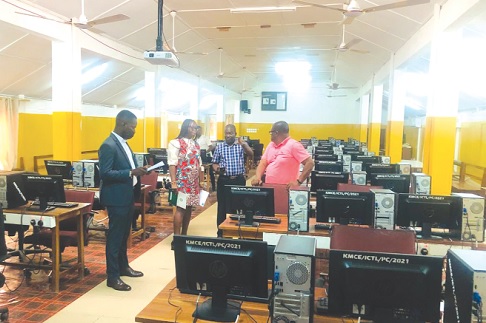Governance is often described as a continuous process, and as Ghana navigates the complexities of a new government era, the landscape of education, especially the colleges of education is at a crossroads.
The 46 public colleges of education are currently grappling with ongoing industrial strikes that have significantly impacted academic activities.
These institutions play a vital role in training and nurturing future educators, yet they have encountered numerous challenges over the past eight years in their effort to prepare teachers for Ghana’s basic schools.
Key among the challenges faced in the last decade is a high infrastructural deficit in the colleges which led to the introduction of a “double-track system” in recent years.
A glance through the NDC 2024 Manifesto highlights 10 key items related to colleges of education.
After nearly a decade of advocacy for teacher education and influencing national policy regarding the well-being of our colleges of education, I would like to share some insights on five out of the 10 items in the NDC Manifesto as they may reflect the future of the colleges of education under the John Mahama-led administration.
Trainee allowance
The first is the provision of trainee allowances, student loans, and other diverse funding options for teacher and nurse trainees.
Several stakeholders have expressed concerns about the relevance of the trainee teachers' allowance in our current economic situation as a country where we need to set priorities right.
The allowance has outlived its purpose, especially since colleges of education are now training degree-awarding students akin to traditional universities.
There are numerous challenges facing these colleges that could be better addressed with these financial resources.
Trainee teachers should be provided financial assistance through the Student Loan Trust Fund instead of payment of allowance.
Teacher licensure
The second is the abolishment of the teacher licensure examination and integration of the licensing process into the final-year examination of trainees.
This is one of the campaign promises made by the NDC that got the support of trainee teachers. While the Mahama-led administration aims to fulfil this promise, it is essential to approach it carefully to avoid jeopardising the international recognition that our teacher licensing has gained.
According to the Education Regulatory Bodies Act, 2020, Section 68, Clause (1), “A person does not qualify to practice as a teacher unless that person (a) holds a certificate from an institution recognised by the Board; and (b) passes a licentiate examination conducted by the Board.”
There is no doubt that the NDC possesses the numbers to repeal or amend this Act. However, we must proceed with caution to preserve the international standing of the Ghana Teacher License, which has opened doors for countless teachers seeking employment abroad.
Affordable accommodation
The NDC Manifesto promises to implement a 'Bed for All' programme by investing in student hostels and expanding accommodation facilities for tertiary students through public-private partnership (PPP) schemes and collaboration with private investors to regulate housing costs.
This initiative could be a game-changer for the colleges of education. However, the challenge lies in the low enrolment numbers in the colleges.
Many senior high school graduates apply to the 46 public colleges of education but face denial of admission due to inadequate infrastructure and quota limitations influenced by the payment of trainee teachers' allowances and student feeding programmes.
In recent years, approximately 100,000 graduates have applied to the colleges annually, but only around 15,000 are admitted across all 46 institutions.
The Mahama-led administration should take a proactive approach to increase student admissions by removing the bottlenecks, making colleges more appealing to private investors and helping to address the infrastructure challenges, particularly regarding hostel facilities.
Empowering Governing Councils
The manifestoes of public tertiary institutions operate without external interference. This initiative represents an important governance promise for our educational institutions as outlined in the NDC Manifesto.
Some colleges of education have encountered considerable challenges due to external interference in the oversight responsibilities of their Governing Councils.
Unfortunately, the Ghana Tertiary Education Commission (GTEC) has, in some cases over the past few years, undermined decisions made by certain Councils, adversely affecting the smooth operation of these institutions.
There should be a clear distinction between the work of a regulator and oversight responsibilities by the Governing Councils.
Relationship
Regularising the affiliation relationship between universities and colleges of education to make the colleges more effective in delivering quality education through the Ghana Tertiary Education Commission (GTEC) is a major issue in the manifesto.
This is one area that needs a thorough review with the involvement of all stakeholders in the teacher education space, supported by expert advice from GTEC.
Many colleges have suffered due to their new affiliations with some of the mentoring universities, raising concerns about the potential absorption of colleges into the mentoring institutions.
This could lead to a loss of some colleges’ uniqueness, culture and traditions, particularly for faith-based colleges of education.
Additionally, ongoing industrial strikes by teaching and non-teaching staff in the colleges stem from issues related to these affiliations, migration and the transition of staff onto the payrolls of the mentoring institutions.
These issues must be handled dispassionately with the interest of the colleges rather than other institutions.
I conclude by urging the new government and the incoming Minister of Education, Haruna Iddrisu, to focus on consolidating the gains achieved by the colleges despite the numerous challenges faced over the years.
There are calls for a review of the curricula for the colleges, which we anticipate. Additionally, the government must prioritise the completion of all abandoned infrastructure projects in the colleges.
The writer is the Editor of the Teacher Education Journal.
Email: tejnews233@gmail.com

